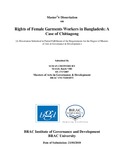Rights of female garments workers in Bangladesh: a case of Chittagong

View/
Date
2018-01-21Publisher
BRAC UniversityAuthor
Chowdhury, SumanMetadata
Show full item recordAbstract
The continuing exploitation of women workers in clothing factories across the world is a damning indictment of the global economic system. In Bangladesh, women workers account for 85% of the total workforce in the garment industry. While some have viewed this as a positive step towards female emancipation, the reality is that women are employed in a highly exploitative context. Women workers remain at the bottom of the supply chain, working long hours for poverty wages and denied basic maternity rights.
This study seeks to expose the current condition of female workers’ rights in the Bangladeshi garment industry especially in the Chittagong City’s various garments.The data has been collected from both primary and secondary sources. A simple questionnaire was used in the survey. The sample consisted of 120 women workers selected randomly form 7 different garment factories in Chittagong metropolitan area. SPSS and XL, different tabular form used to analysis the data in this study.
The results show that the female workers are mostly employed at the lower category of jobs like operator, finishing helper, polder etc. These jobs are very monotonous in nature. Because of the nature of their jobs, female workers sometimes lose interest in work and become depressed. A large number of female workers received low and irregular wages which create their job dissatisfaction. Female workers are sexually harassed by their co-workers in the factory or by police or by mastans (goons) in commuting to working factory. Communication is a major problem faced by most of the female garment workers. A long distance travel is not only physical strenuous but also mentally stressful. Their overtime rate is very low. Long working hours result in a number of illnesses, diseases and various health hazards. Women are exploited easily due to lack of technical knowledge, low education level and training.The study concludes with recommendations on what can be done to ensure enhanced respect for female workers’ rights in Bangladesh that will have positive impact into our national economy, the study hope.
